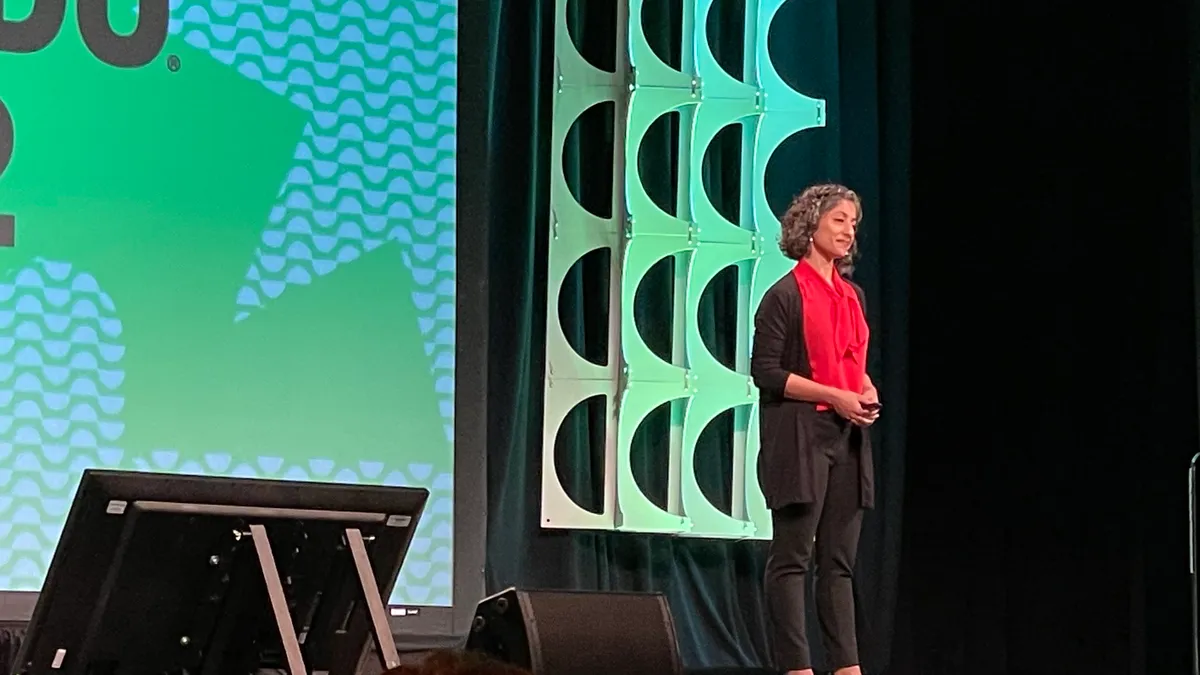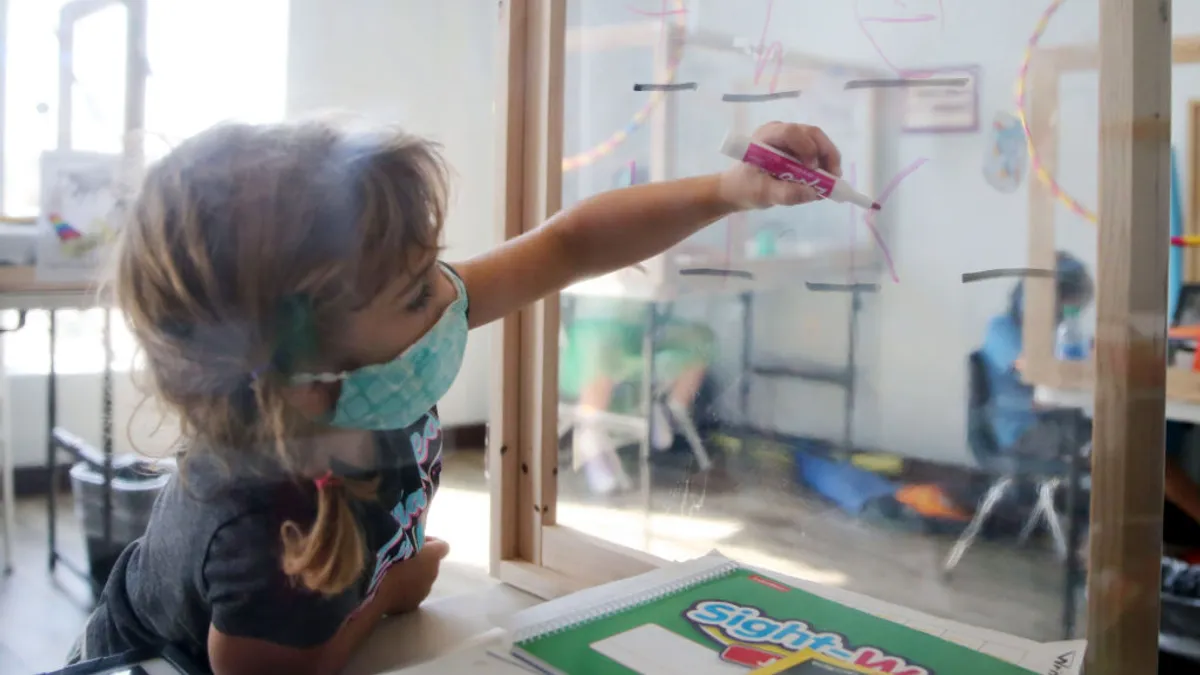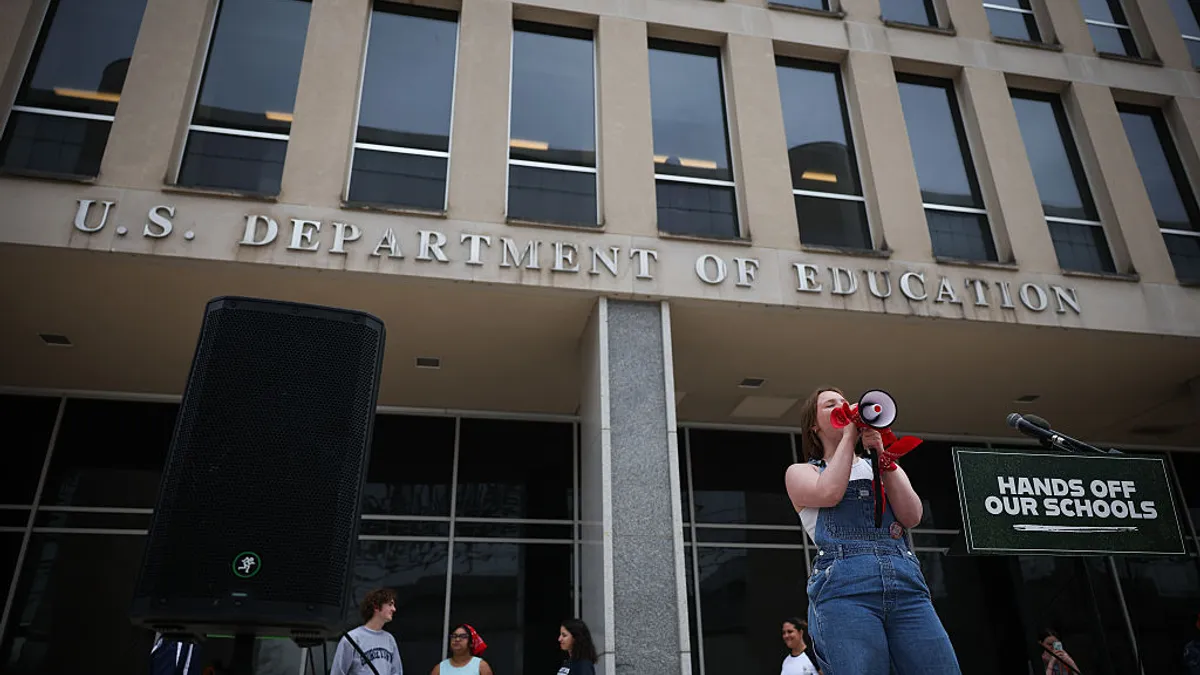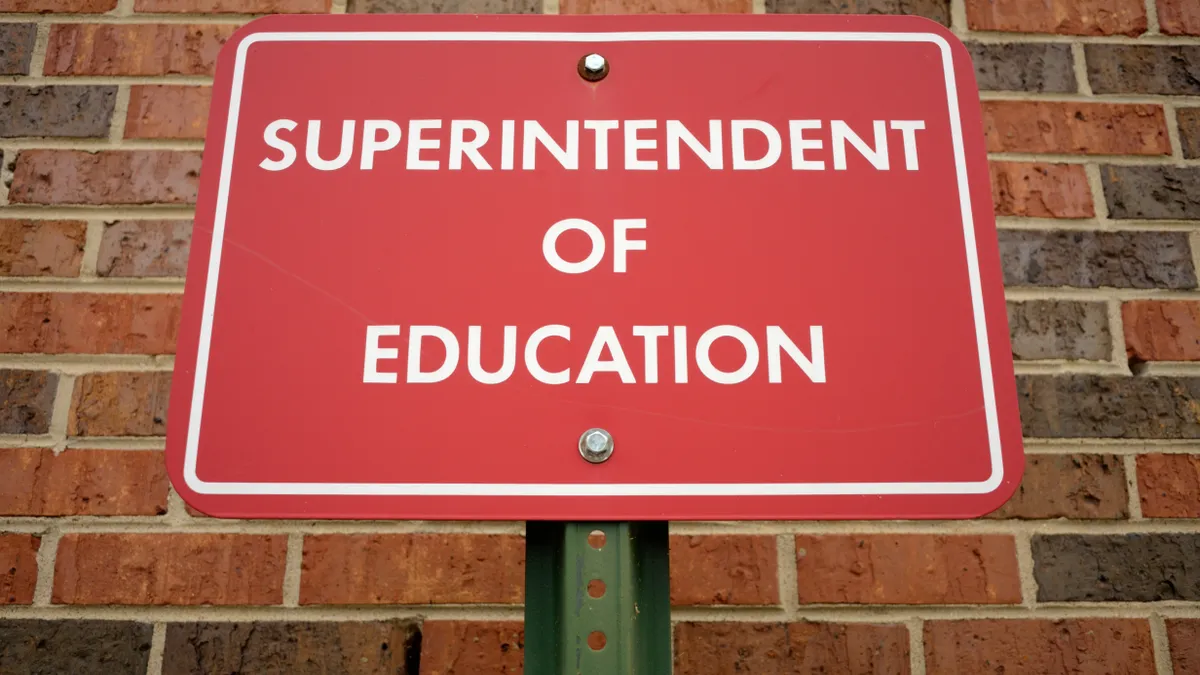This week, K-12 Dive is on-site in Austin, Texas, at the SXSW EDU conference. Below is a recap of sessions during the conference's first full day.
SXSW EDU, the SXSW festival’s education innovation extravaganza, kicked off Monday morning with an opening keynote from educator, cognitive psychologist and “Powerful Teaching” author Pooja Agarwal.
Introducing Agarwal, Ron Reed, the conference’s founder and executive producer, welcomed a packed Austin Convention Center ballroom to the organization’s first in-person event since 2019, citing SXSW EDU’s core themes of power, resilience, boundless curiosity and humanity.
These themes would come into play throughout Agarwal’s talk, which focused on the power of retrieval practice, a strategy for boosting learning through the recall of information. Agarwal, who teaches psychology and neuroscience at the Berklee College of Music in Boston, has been researching how students learn for 15 years, with particular attention to why students forget what they’ve learned and how retrieval practice can more efficiently encode that learning in their minds.
One of the simplest forms of retrieval practice, Agarwal explained, is to review — but rather than an educator recapping the previous day’s lesson or the last unit, they should begin the next class or unit by asking students to recall what was learned.
This can be done via a “brain dump,” or free recall exercise in which students are asked to write down everything they can remember, or just by asking them to retrieve two things they remember. But above all, she said, these exercises should be low stakes, quick and not graded.
Agarwal also advised attendees to tailor their approach to the students they serve, whether they’re in early childhood, K-12 or higher ed, because educators know their students best.
In her research with middle and high school classrooms near St. Louis over 10 years, Agarwal and her colleagues found quick retrieval practice quizzes raised students’ grades from a C to an A on average. Additionally, 75% of students said retrieval practice reduced their anxiety about learning.
When students are comfortable with their own knowledge, they feel good, she said. “This doesn’t happen in a vacuum … There’s a lot going on for us and our students.”
She and her colleagues also found evidence these benefits persist around the world.
For more on retrieval practice, Agarwal provided these resources.
Starting off @SXSWEDU, @PoojaAgarwal with warm & engaging description about how to get students to remember - power of #retrievalpractice to drive learning, reduce anxiety. Great tips and evidence based insights. pic.twitter.com/a8lU2bf4Sh
— Devon Skerritt (he/him/his) (@dskerritt) March 7, 2022
Wonderful SXSW EDU keynote speaker @PoojaAgarwal is giving me all sorts of ideas and reinforcing things I’ve learned & do. I love having science confirm what we know is best. “Easy learning is easy forgetting.” #retrievalpractice pic.twitter.com/netLGFcPIN
— Richardsonasaur (@richardsonasaur) March 7, 2022
“Retrieval practice is a learning strategy NOT an assessment strategy.”
— AnnaForLISD (@AnnaForLISD) March 7, 2022
Fantastic opening session w/ Dr. Pooja K. Agarwal at #SXSWEDU pic.twitter.com/s1QbWuICa5
How can districts maintain pandemic-era universal meal momentum?
Pandemic-era waivers by the U.S. Department of Agriculture made it possible to grant universal free school meals to all learners in the 2019-20 through 2021-22 school years, and an SXSW EDU afternoon panel of school food nutrition experts and advocates discussed how to build upon that momentum to ensure all students continue to have access to free and healthy meals.
Although the waiver is set to expire June 30, Congress could extend it in a spending bill being discussed this week.
However, Monday’s panel discussion came as CNN reported that Senate Majority Leader Mitch McConnell is planning to block extension of the waivers. The current waivers allow the USDA to authorize universal school meals nationwide and provide meal flexibility to help schools handle supply chain and labor issues.
Even if Congress doesn’t extend these waivers and universal school meals are no more, there are still opportunities to leverage policies that ensure free meals for all students at the state level, said panelist Luis Guardia, president of Food Research and Action Center.
For instance, Guardia said, the community eligibility provision could be expanded by Congress. That provision currently allows districts in low-income areas to serve meals at no cost to all enrolled students without requiring households to apply.
Look for a K-12 Dive story in the coming days with more details from the panel and the updated status of universal meals in Congress.
Revolutionizing assessments easier said than done
In a Monday afternoon session, assessment experts from the Worcester Polytechnic Institute in Massachusetts, CenterPoint Education Solutions and Roblox discussed how schools can take advantage of technological innovation by using game-based assessments and automated feedback to improve students’ experiences.
Jack Buckley, head of people science and analytics and assessment at Roblox, an online game platform and game creation system popular with teens and tweens, said the company’s education and workforce development efforts are focusing on assessment in the metaverse with game-based assessment for employee recruitment and hiring.
The difficulty in designing an assessment that can predict if you’d be successful on the job, however, parallels the challenge of using artificial intelligence and machine learning in assessment more broadly. Buckley has additional firsthand experience with this from his time at the U.S. Department of Education, where he served as commissioner of the National Center for Education Statistics and worked on the National Assessment of Educational Progress.
Most of the algorithms people throw at student data during an assessment process don’t yield the kind of information that would actually measure something like student achievement, because they weren’t designed for that, Buckley said.
Simply put, educators “don’t have to worry about AI taking over the world” anytime soon, said Neil Heffernan, a computer science researcher at Worcester Polytechnic Institute.
Laura Slover, CEO of nonprofit curriculum developer CenterPoint Education Solutions, suggested it’s also important to embed “stealth assessments” in curriculum that students don’t realize they’re taking because they look like the rest of the content.
Slover previously worked at Achieve, a nonprofit student assessment inventory for school districts, during the rollout of Common Core-aligned PARCC and Smarter Balanced state assessments, assisting 19 states in developing those tests. Despite advancements during that time — which included a transition to about 80% of students taking state assessments online — she said they ultimately fell short of delivering on the promise of getting results back more quickly to provide insights to educators and parents.
Ultimately, that challenge remains at the core of improving assessment today.
How a one-square-mile Rhode Island district engaged community in learning pods
Central Falls School District, located in the smallest town in the nation’s smallest state, has been under state takeover because of financial hardship since 1992. Meanwhile, among the equity concerns in the majority Latino community’s schools: Most educators didn’t come from the same backgrounds as students or have understanding of their experiences.
In response to the pandemic, however, the district worked with the local Highlander Institute and Freedom Dreams to adopt learning pod, tutoring and mentorship opportunities it saw available in more affluent communities.
During an afternoon session moderated by the Center for Reinventing Public Education’s Travis Pillow, the logistics of making this happen — and how it could diversify the district’s educator pipelines — was discussed by Central Falls Director of Grants Tatiana Baena, Highlander Institute Chief Innovation Officer Malika Ali, and Freedom Dreams Founder and CEO Simona Simpson-Thomas.
Stay tuned in the coming days for a closer look at who the district sought to enlist as pod leaders, how it gained community and family buy-in, and how leaders hope the initiative might evolve.
Reimagining the one teacher, one classroom model
Speakers challenged and reimagined the model of one teacher instructing a classroom of 25 students during a session titled “Next Education Workforce: Beyond Teacher Shortage.”
Instead of having one teacher in one classroom of 25 students, there could potentially be four teachers sharing a classroom of 100 students in a model that is team-based and better distributes teacher expertise, said Kimberly Wright, senior program manager of Next Education Workforce at Arizona State University’s Mary Lou Fulton Teachers College.
These models can include a team of lead teachers, teacher prep students, high-dosage tutors, social workers and more in one bigger classroom.
In the short term, this model could address teacher shortages — and also create new avenues for how teachers enter the profession, said Brent Maddin, executive director of Next Education Workforce, which partners with schools to build team-based learning experiences.
“When you start to dismantle the one teacher, one classroom model, it turns out there are all sorts of other things that start to happen that are really interesting,” Maddin said.
It’s important to keep in mind that a community’s context will determine what a team-based model looks like, Maddin said. Developing a model like this should “move at the speed of trust” in a school community, and it should ultimately benefit students, families and educators, Maddin said.
ASU’s education college has a strong partnership with the nearby Mesa Public Schools that helps provide teacher residents to work in emerging team-based models in the district.
Greg Mendez, principal of Riverview High School in Mesa, Arizona, told the session Mesa Public Schools Superintendent Andi Fourlis aims to have 50% of schools in the district use team-based models within the next four years.









 Dive Awards
Dive Awards














